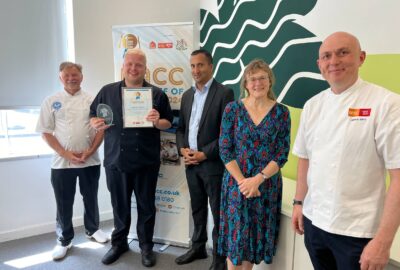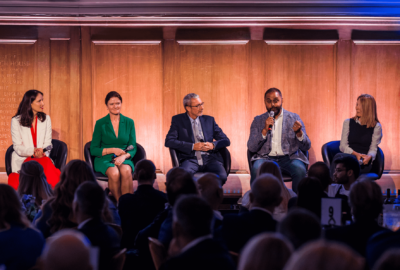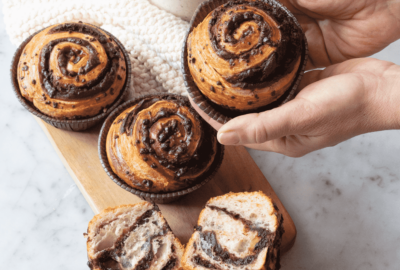With over 20 years of catering experience behind him, self-taught chef Richard Bramble has had to do things the hard way. Now running Bramble Dining with his wife Claudia, catering for the rich and famous, we spoke to Richard about his route into hospitality.
When and how did your passion for food begin?
My dad was a chef so some of my earliest memories were of being in the restaurant on a Saturday afternoon. I remember I would sweep the floor and the owner would pay me a fiver. As I started to cook as a teenager, I realised that cooking wasn’t just about what was on the plate, but it was about bringing people together.
Did you have any mentors?
I had two very good mentors who looked after me and helped me develop. Mark Protty got me on the stove straight away and taught me everything there was to know about that. He also looked after me outside work, showed an interest and made sure I was on the right track.
The other mentor was Christophe Charpentier. He taught me structure, how to manage, how to delegate, how to get the most out of the team and how to run things. It was under him that I think I really started to develop my all-round skills as a chef.
Describe your cooking style?
My philosophy is all about clean, fresh and honest food and cooking everything to the best of my ability. I have some farmer friends who supply us, and I understand how much work goes into producing certain vegetables or meats so I’m very passionate about giving respect to each and every ingredient. I don’t like to play around with it too much as I often think you lose the core flavour of the ingredients you’re using. It’s very much about letting the ingredients sing.
Tell us about the menus you offer?
Our menus replicate the seasons. We create three new menus every January at three different price bands. It may be that I’m not happy with certain dishes, want to freshen things up or take advantage of some new seasonal produce so it’s easy to replace dishes on the menus. One of our new dishes that has been very popular is our prawn and lobster with a celeriac remoulade, a tomato essence jelly, green micro herbs, and a touch of caviar. It’s light, fresh, vibrant in colour and a great representation of what we do.
What is the target – bricks and mortar restaurant?
The future plan is to grow the team, specifically by employing some young, local people. I want the business to be a safe haven for young chefs to be able to develop and succeed. Our business may have three or four events a week so it’s a great place for chefs to learn, earn and find balance in life.
Who inspires you in the industry? Any chefs you look up to/follow?
I love watching Jules Cooking on Instagram and I’m a huge fan of Ottolenghi. I have been really enjoying Middle Eastern dishes recently and Ottolenghi is a big part of that. While we don’t specialise in it ourselves for our private dining, big dishes, sharing plates that go in the middle of the table and that meze, relaxed way of eating is a great way to bring people together. We’re actually seeing a lot of weddings go in that direction now rather than the 3 or 4 course format.
Can the industry do anything better? How would you change it?
I think people need to be paid their worth and employers need to ensure staff have balance in their lives. I also think there needs to be more support for independent restaurants. In Leamington where I am based, there used to be a whole host of independent restaurants offering different cuisines, styles and expressing themselves. Unfortunately, many of these have now gone and it leaves a huge gap for consumers, for the towns and for local chefs looking to grow in the industry. The independent restaurants really help to develop and mould chefs and drive creativity.
What’s your advice to someone starting out in the kitchen?
Work in a tidy manner. It’s difficult to create beautiful things when you’re working in mess.
Communication with the team is key.
Leave egos at the door. Egos don’t belong in a kitchen, it’s all about the team.
Learn from your mistakes. We all make them, don’t be embarrassed by them and always learn from them.
What makes your business unique/special?
Most of our work comes from recommendations and word of mouth so I think it’s the focus, concentration and personal touch we’re able to give to our clients that sets us apart.
What do you have happening in the next few months?
We have some very exciting events on the horizon and we’ve just been given our alcohol licence so we’re launching a new drinks menu for the summer, which will include some fantastic wines and a great range of classic cocktails.
If you could cook for three people dead or alive, who would they be and what would you make?
I would go for Steven Gerrard as I am a huge Liverpool fan and would love to talk to him about that famous Champions League final victory over AC Milan. David Attenborough would be there as he would have some incredible stories to tell and I’m a big music fan so I would probably go with Prince.
Where is the business based and how many is in the team?
We’re based in Leamington Spa where we have a full professional test kitchen that is perfect for our needs. It’s only my wife and I working full time but we have a great team of waiters in London and in the Cotswolds. I don’t think waiters get the respect they deserve. Our team are exceptional with many trained at the Dorchester and Claridge’s so I can’t speak highly enough about them. They’re a huge credit to what we do.
What were the key steps in your development and career?
Being in foster care growing up, as soon as I was old enough to work, I went and got a job in the kitchen. My older brother was a cook and had been let down by a kitchen porter so I stepped in and helped out. That was my first job really and I went from there. It started as a shift on a Saturday afternoon, then Saturday nights and then Fridays. My foster parents were very supportive and were happy as they always knew where I was. By the age of 16, I knew I had found my role in the world and that’s when I started to knuckle down, learn my craft and make some money.
How do you create new dishes? What is the process?
There is no straight answer really.
I find a lot of inspiration in lots of different areas. It may be an ingredient that has just come into season, or I have seen another chef do something or try a different technique that piques my interest.
Or a flavour I have enjoyed. I then think about it and try to break things down and work out what I have to do to get that result. It’s a bit of thinking and idea generation, plus plenty of practising. Often a dish is amazing in your head but on the plate or palate, it doesn’t quite work or something is missing so tweaking and refining is always required.



